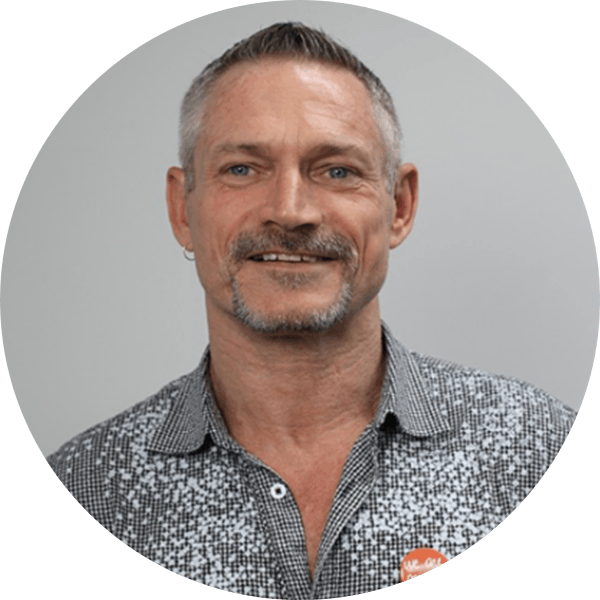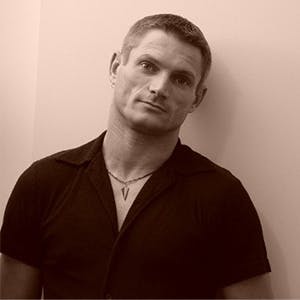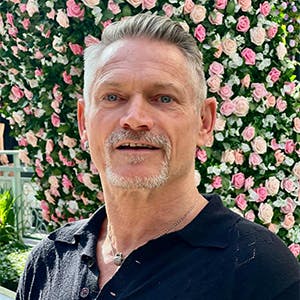
A LETTER TO MY YOUNGER SELF
By Garry Brough, NHS Programme Manager
To my younger self,
People say that your twenties are some of the most difficult years of your life – figuring out work, relationships and how to become independent. Writing from the future, I can confirm that you will experience many challenges. In fact, you will be diagnosed with HIV at 23, and be told that you have just five years to live. Over the next seven years, your health will start to decline, despite your best efforts to stay healthy. Please don’t lose hope – change is just around the corner.
With the availability of innovative HIV treatments, you’ll find a new lease on life. You’ll meet some inspiring people, do things you never thought you’d be able to do, live your best life and carve out a fulfilling career as a HIV advocate and peer support champion. I never thought I’d be writing this letter, but here I am, now in my 50s, sharing my experience and advice for other people living with HIV to lead a better and healthier life.

Newly graduated in 1992, two years after your diagnosis
Knowledge is power
In the early 1990s, we still knew very little about HIV. While there is greater awareness today, many people still aren’t aware that someone living with HIV who is on treatment, with an undetectable viral load, cannot pass HIV on to their sexual partners. This is known as U=U and stands for ‘undetectable = untransmittable’. This prevention method is estimated to be 100% effective as long as the person living with HIV takes their medication as prescribed and gets and stays undetectable. Having this knowledge will increase your confidence when discussing your treatment and care with your doctor, and will free you from anxiety when dating. I would strongly encourage anyone diagnosed with HIV to find out more about U=U and take an interest in learning more about all aspects of HIV.
If any information is difficult to find or understand, reach out to a peer support organisation or group. Speaking to people who live well with HIV and discovering how they manage their own HIV treatment and care will help empower you to have more meaningful and positive conversations with your doctor. This will be particularly important as you get older and need to understand how to manage other health issues in addition to your HIV.
Play an active role in your own healthcare
My second piece of advice is to play a more active role in your own treatment and care. I know this doesn’t come naturally at first and many people newly diagnosed with HIV start their journey as a passive recipient of care. But this shouldn’t be the case. You have an important role to play in deciding what type of care suits your needs and lifestyle.
So, how do you become more active in your care? In addition to expanding your knowledge on HIV, I’d also encourage you to make the most of your time with your doctor by preparing questions and identifying key topics in advance of your appointment. Don’t be afraid to ask for clarification to check you’ve understood what’s been said correctly and take notes so you can refer back to them later.
With time, your consultations will start to focus on more than just viral suppression and look at how you can also achieve a better quality of life to suit your individual needs. You might be hesitant at first to consider changes to your treatment but stick with what works and change what doesn’t; after several initial changes it has taken me 20 years to switch to a different treatment regimen when one worked well. Make sure you weigh up the pros and cons and discuss these with your doctor. You deserve to be on a treatment which meets your personal needs and preferences.

You in 1998, a year or two after starting treatment
Decide what a healthier life looks like for you
Use your HIV diagnosis as an opportunity to think about your future and consider all aspects of health that make up who you are and support your lifestyle. Start with the basics: improve your diet, stop smoking, limit your alcohol intake, and be more active in your day-to-day life. You’ll soon start to see the benefits on your physical and mental health.
A healthy life should also be fun and exciting. Community support groups are a great way for people living with HIV to meet others and build connections while doing things that support healthy living. Though it may seem unlikely now, you will eventually become a member of the Positive Health Programme, set up by the YMCA in 1997, and will set foot in the gym for the first time!
Planning for the future may seem like a long way off right now. However, by making small lifestyle changes now, you can help prepare for a healthier and happier future.
You are not alone
Finally, remember you are not alone. At the start of your journey, others will be struggling with the side effects of early antiretroviral treatments and, even to this day, there are people struggling with the impact of HIV stigma. Peer support will be a key factor in getting you through the tough times. Reach out and ask for help. One day, when you’re older, you’ll be able to share your experiences to help others find their own ways to live well with HIV.
You will become someone who is not just living well with HIV - but thriving.

Us in 2023, living a happy and healthy life with HIV!
Love from,
Garry
NP-GBL-HVX-COCO-230019
If you get any side effects, talk to your doctor, pharmacist, or nurse. This includes any possible side effects not listed in the package leaflet. You can also report side effects directly via the GSK Reporting Tool link https://gsk.public.reportum.com/. By reporting side effects, you can help provide more information on the safety of this medicine.
If you are from outside the UK, you can report adverse events to GSK/ ViiV by selecting your region and market, here.